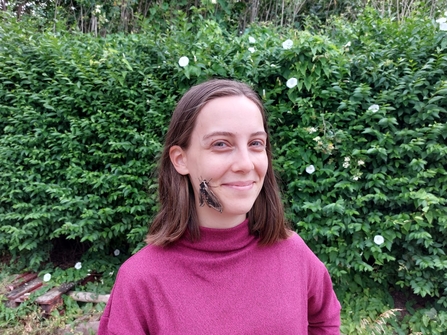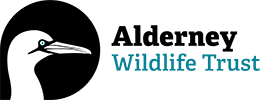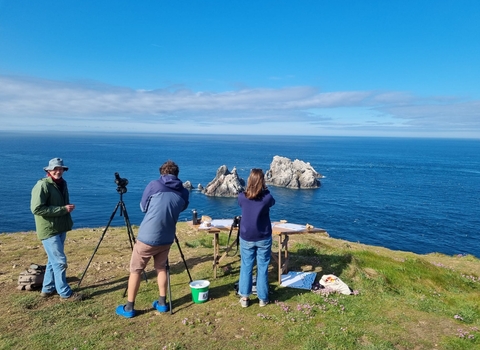Here you will find some write ups from past AWT staff on how their time in Alderney helped them progress their careers and the skills they gained from their volunteer placements with us.
We hope this helps - you can see our job vacancies here and if you have any questions please just get in touch.
Conservation Officer
Ellen Smith 2021-2022
My time as Conservation and Carbon Planning Officer for AWT has been invaluable as a stepping stone between education and paid work. As an entry-level role, you are given a fair amount of responsibility, allowing you to develop vital skills for future employment in the sector rapidly.
Some of the highlights of my time on Alderney include leading the Conservation Volunteering group, which worked around the island to complete important conservation projects. Some of the most successful sessions, with up to 30 attendees, include tree planting and removing the invasive species Sour Fig. We also engaged St Anne’s School and the Youth Group, which was one of the most rewarding elements of the role.
As a small organisation, you work closely with the other team members and are able to develop the skills you are most passionate about. For example, I was responsible for coordinating the conservation grazing project, developing botanical surveying and livestock management skills.
Whilst I will miss Alderney (it really is a beautiful, welcoming island community), I am pleased to say I will continue working in the sector as an Assistant Farm Environment Advisor for FWAG South West (Farming and Wildlife Advisory Group). The experience and skills gained from my placement with AWT were essential to my gaining this role. I would wholeheartedly recommend this placement for recent graduates or people wanting to make a first step into the conservation sector!
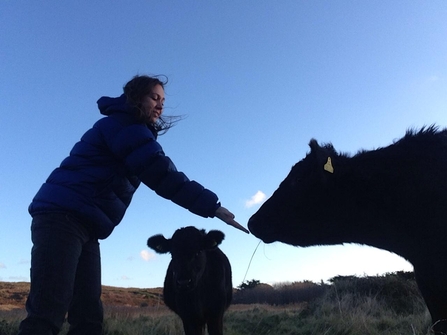
Thomas Marceau 2020
Fresh off graduating from an integrated Master’s degree, I joined the AWT in 2020 as Conservation Officer, seeking to develop my practical skills. Working for the AWT allowed me to take on a great deal of responsibility and acquire many new skills, such as driving a tractor. The amount of trust that the AWT places in its staff is far beyond what is usually expected at this level, meaning that you get to explore many different elements of the conservation world. The work I undertook as Conservation Officer was varied, ranging from tackling invasive species to managing the Alderney Grazing Animal Project. Another positive side to working for the AWT is that there is scope to focus on areas which particularly interest you and it is fair to say that every Conservation Officer has approached the role in their own way.
Having joined the AWT in 2020, and lived through the pandemic including the first lockdown, I experienced working for the AWT in what can only be described as a time of global crisis. Nevertheless, the AWT was able to weather the storm and continue with its work. This meant that I was lucky enough to enjoy a full year of practical conservation work, ecological surveying and a healthy social life in a year that was, for most people, one to forget. Due to these constraints, the teamwork and interconnectivity between departments at the AWT was on display more than ever. All team members were able to assist with events, media appearances, ecological surveying and practical tasks.
I hope that the skills I acquired as Conservation Officer will help me secure a new position shortly. Spending a year in Alderney has definitely made me more confident in approaching new roles, and I know that, whatever my next job may be, I will be able to make use of my Alderney experience.
Mariko Whyte 2016-2017
Joining the Alderney Wildlife Trust was a fantastic opportunity for me. I came to Alderney in September 2016 immediately following a MSc in Biodiversity & Conservation. For me, the Masters was a change of direction, so I didn’t have much in the way of practical experience excepting 5 months of volunteering with the RSPB at home in Dorset.
The role with AWT was exactly what I needed as it offered an opportunity to get stuck in and develop my skills in all aspects of the Trust’s work. As Conservation Officer I had overall responsibility for the terrestrial reserves and sites including planning and undertaking practical tasks, managing and supporting the brilliant and experienced team of conservation volunteers and producing management plans and actions plans for the sites.
As the smallest of the Wildlife Trusts, you get a lot of responsibility from the start, which you wouldn’t necessarily get in a larger organisation. The experience I gained in the production of the new 5-year management plan for the Longis Reserve and the associated public consultation was really valuable. I also gained a lot of practical skills in terms of carrying out habitat and site management, driving the tractor and using machinery and tools, managing livestock and managing and working with volunteers.
One of the best things about the AWT experience is also the chance to get involved in public events, engagement and other activities. Really, there is the opportunity to develop your knowledge and your role in almost any aspect you want, as long as you’re getting the job done!
It was through the AWT that I first became interested in bats, through a visit to Jersey for the Channel Islands Bat Conference. This, and my interest in invertebrates are probably the two main influences that I have taken on to my next roles. Since returning to the UK, I have worked on developing my knowledge in these areas in particular, and have returned to Alderney since to continue to record bats and invertebrates. I think it’s hugely important to be able to continue to develop on the knowledge of these under-recorded groups on Alderney.
I now work in ecological consultancy, and bat surveys and assessments are a major part of the work we do. We provide ecological assessments and protected species surveys for planning and development. I am hoping that in time I will also be able to specialise in entomological surveys, but it takes a lot of work to be able to cover the main groups of invertebrates at a professional level!
Quite apart from the experience working with the Trust, I loved everything about Alderney, from the landscape and the wildlife, the history and places to explore to the people and the fantastic sense of community. I made lifelong friends during my time on the island and hope to continue returning for many years to come.
Ramsar Officer
Joshua Copping 2017
I first came to Alderney in 2016 to work with the Alderney Wildlife Trust on a 2-month research placement during my MSc. I was instantly blow away by the island’s crystal-clear seas, coastal wildflower displays, and wildlife; it’s really like nowhere else. Although my time with the Trust was only brief, I gained a lot of experience. This was not only through my own research, but also helping the AWT staff with some of their work commitments and public events. I really enjoyed my time on Alderney and knew I wanted to return at some point.
So, in 2017 after I’d graduated, I came back to work for the AWT as the Ramsar Officer. I greatly enjoyed this role as my tasks and responsibilities varied day to day. Some weeks I’d be out of the office, monitoring the island’s seabird population, carrying out marine surveys, leading kayaking tours or helping in public events. Other times I’d be analysing data, writing reports or working on articles about Alderney’s seabirds and marine environment. I was free to help other staff members and get involved in other exciting surveys, as long as I got my tasks done. The varied nature of this role kept the job interesting and I gained a range of transferable skills and knowledge.
I’m now towards the end of a PhD and believe my time with the AWT helped prepare me for this. A big part of me misses the fun nature of the job and the ability to spend so much time outside working in such a special place. I loved my time on Alderney, exploring the island and making lifelong friends, and really look forward to each time I return.
Filip Wieckowski 2016
I came to Alderney as Ramsar officer in 2016 because I needed more experience with seabirds. I was lucky that 2016 was the last year in a management cycle which meant a new five-year management strategy needed to be written. This gave me the opportunity to have full oversight of the marine program for Alderney Wildlife Trust and involve the community in the design of the site strategy.
Aside from gaining experience in the amazing monitoring fieldwork and eco-tourism the Trust leads, I was able to be involved in some media outreach, community and schools events, and developed my managerial and administration skills through delivery of the site strategy.
Since leaving Alderney I have worked in Brussels, Turkey, and Malta, and completed an MSc in Conservation. I now work as Conservation Manager for Blue Ventures in Timor-Leste, supporting small coastal communities to manage their fisheries more sustainably, protect marine biodiversity and secure their livelihoods for the future. Developing the strategy for the Ramsar site in Alderney set me up for leadership roles in the marine conservation sector and gave me some of the happiest experiences with some of the most interesting people. The seabirds, the beaches and the pizza are amazing!
Outreach Officer
Claire Thorpe 2016-2020
I joined the AWT in 2016 for one of the Outreach volunteer placement. I had recently finished my masters in Conservation and after briefly working a paid job for a health charity I moved to Alderney to pursue a career in conservation. While moving over was a big decision, working for the AWT taught me so much and helped me realise the work streams I was most interested in. I was lucky enough to be given a bursary after my first year, meaning I stayed in a paid role until 2020 when the bursary ended.
During this time I was able to do work on things as varied as editing and compiling the Alderney Wildlife magazine, leading school visits, writing funding applications and providing updates on the local radio. The outreach role is hugely varied and has the flexibility to allow the volunteer to really develop their skills. I was also able to maintain a butterfly and bumblebee transect, getting some time out of the office and gaining more specific species ID.
I now work in communications, without the start that the AWT gave me in design work and science communication I am sure it would have been a lot harder to get the roles I was interested in.
Alderney is one of the friendliest places I have ever been. Everyone is so welcoming and will go out of their way to help you find work, get involved with activities etc. Seeing the island through the seasons was also a real joy, watching the species change and helping engage others with this island's wildlife.
Ecologist
Daniel Whitelegg 2021-2023
After an incredible two years with the AWT working as the Ecologist, it has come for me to say ‘Tenki et addi’ (in my best Alderney Patois)! Every day has genuinely been so different and full of surprises that it is hard to pick out the many highlights of the role. One of the things I will always be grateful for and remember is the warmness and friendly manner in which the island works.
Coming into the role of focusing on the development of the ABC (Alderney Biodiversity Centre) and studying the breeding of Ringed Plovers, I soon discovered that there was a chance to expand into other areas of the Trust's work. Throughout the time, I also took up managing surveys for bats, moths, breeding birds and hedgehogs.
One of the most important aspects of this work was working with islanders to improve local knowledge about these species and collecting data that could be used for conservation. In particular, the Bailiwick Bat Survey and our Moth Mornings down at Essex Farm provided fantastic results with many volunteers getting enthused about the night-time critters. Both of these are ongoing projects where you can still get involved and I will be keeping a keen ear to the ground about any exciting developments.
Seeing a pod of Bottlenose Dolphins two days in a row after emerging from my self-isolation chrysalis (during COVID-19 pandemic) and finding the first Corncrake on Alderney since 1978 a few days afterwards really cemented how remarkable the island was for wildlife. As a birder from birth, one of the many benefits of the job was being outside and seeing some real avian delights, like White Stork and Honey Buzzard circling together over St Anne or waking up to the fluty song of a Golden Oriole outside my window. In the summer and autumn, I was often able to share these moments with visitors on wildlife tours, creating for them many long-lasting moments in the memory of the island’s natural environment. Watching a group of Pied Flycatchers feeding in a misty Bonne Terre valley by one of the oldest buildings in the Channel Islands was definitely a special moment, where human and natural heritage met in a moment in time.
The roles such as mine that the AWT provides are up there with some of the best for young professionals in the wildlife sector and have set me up well for full-time employment with the RSPB working with beach-nesting birds.
I will miss the nature and people of Alderney greatly but am also excited to hear about the new projects and research that will be taking place over the coming year.
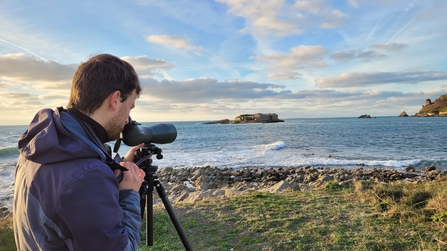
Justin Hart (Lead Ecologist)
I arrived on Alderney in March 2017 and then spent the next 5 1/2 years with the AWT. At times my journey through that period was extra-ordinary and a real roller coaster ride. I experienced a range of highs and lows, including spectacular wildlife encounters and exciting new discoveries but also conservation goals won and lost with occasional set-backs both in-the-field and office and worst of all the horrors of bird flu. Nonetheless, this is life and a conservationist’s world.
Alderney is only a small island but it remains a microcosm of the real world and I think AWT’s fight for nature fairly reflects what’s happening elsewhere albeit on a grander scale. As such I can think of no better place for any future conservationist to come and cut their teeth in this challenging career path. Importantly, AWT staff and its board are committed and their strength provides all the support you’ll need.
My AWT experience was immensely rewarding and helped re-vitalised my career. I owe much to them and the island.
Shorter Term Internships
Camille Francois 2023
From my very first day, I was warmly welcomed by Roland, the CEO of the AWT, and the whole team. I did not have precise expectations but was keen to learn about the local wildlife, and I was not disappointed! Two “WeBS” (the Wetland Bird Survey that happens monthly across the UK) took place during my stay, giving me a great opportunity to learn about the species present around Alderney. I accompanied the AWT Ramsar Officer and Ecologist, Alex and Matt, around the island, doing a census of the bird species interacting with the seaside environment. I also observed nesting Ringed Plovers on the north-western coast of Alderney to determine their “productivity”, i.e. the number of chicks that fledge, and I had the chance to see three tiny Plover chicks. While they look adorable, what makes this sighting especially exciting is that Alderney is the only regular breeding location for these birds in the Channel Islands.
Birds are not the only creatures present on Alderney’s beaches, and Mel, the Living Seas Coordinator, and Lou, an active contributor to the AWT, invited me to a crab survey, teaching me about the different species present on the island’s very productive shores.
Further inland, from the bird hides overlooking Mannez and Longis ponds, I took part in dragonfly surveys with Matt and Rowie, the Outreach Officer. She also took me along on her butterfly transects in the Alderney Community Woodland, teaching me some identification skills to distinguish Meadow Browns from Gatekeepers or Common Blues from Holly Blues, and shared her enthusiasm about moths during the weekly Moth Mornings at Essex Farm.
Once, we brought the moths that were caught (unharmed) in our overnight Moth Trap to one of the local play groups, showing these rather impressive critters to the toddlers who loved looking at them through magnifying glasses before releasing them into the wild. Another memorable experience, with the Aspire Alderney Youth Group this time, was a tasting session for different kinds of seaweed (aptly named sea lettuce, sea spaghetti, etc.). It might have made some children grimace, but it definitely raised their curiosity about this rarely eaten food, which is abundant all around the island. Wild fennel, rock samphire or sea radish are other delicacies that grow around the island and can easily be foraged to spice up one’s cooking!
The whole island is full of treasures of all kinds for those who know where to look, and the most iconic one is perhaps the blonde hedgehog. Going on a Bat & Hedgehog guided tour with Tara, the Terrestrial Ecologist, I got a glimpse of several of Alderney’s nocturnal mammals, both the spikey and flying kind. Bats are the only flying mammals in the world, and Alderney is lucky to count thirteen different species, out of the nineteen present in the UK. While I probably only noticed the very common pipistrelles during the walking tour, the bat detectors I later helped install around the island for the Bailiwick Bat Project picked up several other species, such as the Grey Long-eared Bat or the Kuhl’s Pipistrelle. This inter-island, citizen science project made me discover new places around the island as I booked several locations all around Alderney, on beaches, fields, Victorian forts... I then collected the bat detectors, went to hammer the 4-meter poles in place with the detector at the top, and crossed my fingers that it would still be standing when I came back to retrieve it four days later!
While cycling around the island to install detectors or run other errands, I would often make a detour to visit the Conservation Grazing Herd at Longis Nature Reserve. The six Guernsey/Angus Cross steers play an important role in keeping the reserve’s landscape as biodiverse as possible, by grazing on dominant plants that would otherwise overtake more fragile flora and opening microhabitats for other wildlife, among several other benefits. Making sure the herd was doing well and checking the electric fence was a daily duty that I very much enjoyed—it’s something I never thought I’d one day do!
In Longis Common, I also participated in one of the biweekly Conservation Volunteers (CVs) sessions to remove Ragwort, a plant that is officially considered noxious. Lindsay, a long-time AWT staff member and amateur botanist, could identify most – if not all – plants on the island and was always able to answer my questions about the local flora. Other CV sessions included path maintenance, a beach clean, or my favourite: Sour Fig pulling on the scenic South Cliffs. CV sessions are not only the occasion to do a bit of good for the island’s environment, but it is also an occasion to have a good time with other residents, chatting away while working. Having taken part in several volunteering projects over the past few years, I was keen to hear what the Conservation Volunteers thought about their experience and brainstorm ideas to improve it. Abbie, the Team Wilder Officer, whose role is to listen to and empower the community, proposed that we organise a co-production event with volunteers before my departure. The two-hour session, which counted eight volunteers, was a much-needed time for sharing feedback, reflecting upon past sessions, and planning, and it was very well received by our indefatigable volunteers! To me, it highlighted the importance of listening to stakeholders and has been a valuable experience of good practice to replicate.
Alderney is a place I will always hold dear and being able to do my bit for its conservation felt very rewarding. While the team kindly expressed their appreciation for my work, I feel like I definitely got the best end of the bargain, gaining infinitely more than I could ever give. In one month, I discovered the local flora and fauna, gained some surveying and identification skills, and participated in several citizen science projects and very interesting community engagement and outreach work. Volunteering with the AWT allowed me to discover Alderney as a resident and to quickly form ties with the community. I fully immersed myself in local life, lived a typical Alderney experience, met some wonderful people, and overall, just had a fantastic time.
If I could do it all over again, I would in a heartbeat!
